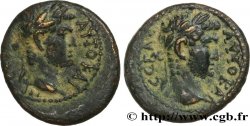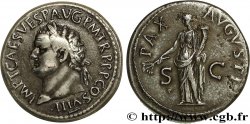brm_586499 - TITUS Denier
недоступный.
Товар уже продан в нашем интернет-магазине (2020)
Цена: : 115.00 €
Товар уже продан в нашем интернет-магазине (2020)
Цена: : 115.00 €
Тип Denier
Дата: 1er janvier - 30 juin
Дата: 80
Монетный двор / Город: Roma
Металл: silver
Проба: 900 ‰
Диаметр: 17,5 mm
Ориентация осей монеты: 6 h.
Вес: 2,71 g.
Редкость: R1
Officine: 5e
Комментарии о состоянии
Monnaie centrée. Métal légèrement cristallisé. Joli revers. Patine grise
Ссылки в каталоге: :
Происхождение:
Exemplaire provenant de la collection Luc Corso
Лицевая сторона
Аверс: легенда: IMP TITVS CAES VESPASIAN AVG P M.
Аверс: описание: Tête laurée de Titus à droite (O*).
Аверс: перевод: “Imperator Titus Cæsar Vespasianus Augustus Pontifex Maximus”, (L’empereur Titus césar Vespasien auguste grand pontife).
Обратная сторона
Реверс: легенда: TR P IX IMP XV COS VIII P P.
Реверс: Описание: Foudre posé sur un trône.
Реверс: перевод: “Tribunicia Potestate nonum Imperator quintum decimum Consul octavum Pater Patriæ”, (Revêtu de la neuvième puissance tribunitienne de la quinzième salutation impériale consul pour la huitième fois père de la patrie).
Комментарий
Poids léger. Ruban de type 2. Il existe au moins trois types de représentations différentes pour le trône : surmonté d’un foudre, d’un dossier circulaire ou d’un dossier triangulaire. Notre denier appartient à la première combinaison. Parfois, le foudre est ailé ce qui est le cas de notre exemplaire. D’autre part, toutes les marques numérales sont surmontées d’un tilde abréviatif. Un tissu est posé sur le trône, il pourrait s’agir du paludamentum (manteau de pourpre rouge du général victorieux, puis de l’empereur).








 Cообщить об ошибке
Cообщить об ошибке Распечатать страницу
Распечатать страницу Отправить мой выбор
Отправить мой выбор Задать вопрос
Задать вопрос Consign / sell
Consign / sell
 Информация
Информация



